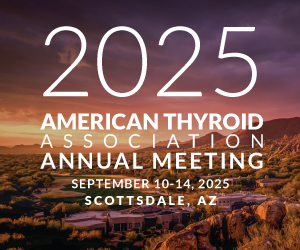September 19, 2016 — Scientists from around the globe will gather at the upcoming 86th Annual Meeting of the American Thyroid Association (ATA), September 21-25, 2016, in Denver, Colorado, to report on advances in thyroidology research. A broad spectrum of topics related to basic scientific research on thyroid development and function and thyroid hormone will be discussed in oral presentations and posters throughout the ATA meeting.
In the oral presentation entitled, “Turning White Fat Brown. Can a Metabolic Villain Be Reformed?” K. Phillips, Baylor College of Medicine, Houston, TX, and J. Lin, Boston University, Boston, MA, demonstrate that drugs capable of activating thyroid hormone (TR) receptor can induce adaptive thermogenesis in white fat cells, in a process called “beiging.” In characterizing this process the researchers found that TR-induced beiging brings about rapid fat loss and anti-diabetic effects, and TR agonists activate beige fat without increasing the activity of classical brown fat.
J. Rodiger and Y. Shi, National Institute of Child Health and Human Development, National Institutes of Health, Bethesda, MD, investigated the “Role of the Histone Methyltransferase PRMT1 in Thyroid Hormone-dependent Intestinal Stem Cell Development in Mice.” In their oral presentation the researchers present evidence showing that PRMT1 is required for proper regeneration of the intestinal epithelium. Their findings indicate that PRMT1 plays a key role in thyroid hormone-dependent intestinal maturation in mice, likely by affecting the formation and/or function of adult intestinal epithelial stem cells.
In an oral presentation, V.L. Poole and colleagues from University of Birmingham and Birmingham Health Partners, U.K., present research that builds on previous work describing a mechanism by which phosphorylation of pituitary tumor-transforming gene-binding factor (PBF) by Src kinase leads to reduced sodium iodide symporter (NIS) expression in the plasma membrane of thyrocytes, thereby decreasing radioiodine uptake. This compromises the efficacy of radioiodine imaging, ablative therapy and treatment of metastases. Evidence reported in “Pharmacological Enhancement of Radioiodine Uptake Through SRC Kinase Inhibition” replicates the finding that a Src kinase inhibitor can rescue NIS expression, and can do so in breast cancer cells as well as thyrocytes. The researchers also identified a more potent inhibitor of PBF phosphorylation, shown to synergistically improve radioiodine uptake when combined with the Src kinase inhibitor dasatinib.
###
The American Thyroid Association (ATA) is the leading worldwide organization dedicated to the advancement, understanding, prevention, diagnosis, and treatment of thyroid disorders and thyroid cancer. ATA is an international membership medical society with over 1,700 members from 43 countries around the world. Celebrating its 93rd anniversary, the ATA delivers its mission — of being devoted to thyroid biology and to the prevention and treatment of thyroid disease through excellence in research, clinical care, education, and public health — through several key endeavors: the publication of highly regarded professional journals, Thyroid, Clinical Thyroidology, and VideoEndocrinology; annual scientific meetings; biennial clinical and research symposia; research grant programs for young investigators, support of online professional, public and patient educational programs; and the development of guidelines for clinical management of thyroid disease and thyroid cancer. The ATA promotes thyroid awareness and information through its online Clinical Thyroidology for the Public and extensive, authoritative explanations of thyroid disease and thyroid cancer in both English and Spanish. The ATA website serves as the clinical resource for patients and the public who look for reliable information on the Internet. Every fifth year, the American Thyroid Association joins with the Latin American Thyroid Society, the European Thyroid Association, and the Asia and Oceania Thyroid Association to co-sponsor the International Thyroid Congress (ITC).



